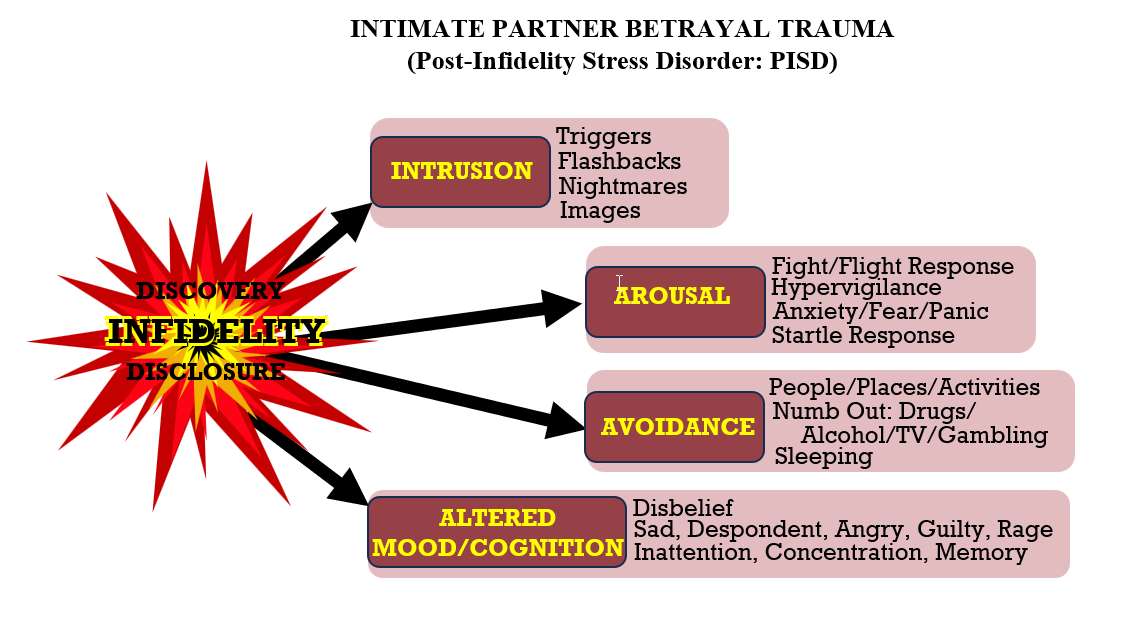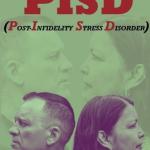Partner Trauma Model
BETRAYED PARTNER: SEEK TRAUMA TREATMENT
In the novel BEYOND PISD, Meg resisted therapy. Her position that Art, not she, had cheated, and he was the one who should be going to therapy. Part of Meg’s reluctance was that the last time she found out about Art’s infidelity, their counsellor didn’t know how to deal effectively with infidelity. Meg eventually agreed to see a therapist who specialized in intimate partner betrayal trauma (Page 191). Under this therapist’s guidance, Meg learned about Post-Infidelity Stress Disorder and strategies for dealing with the complex trauma.
While infidelity is not considered a sufficiently significant event to qualify as a precursor to post-infidelity stress disorder by the American Psychiatric Association, there is mounting evidence that infidelity does have the potential to precipitate PTSD-like symptoms. In fact, intimate betrayal trauma is often considered a complex trauma
Infidelity ended life as you knew it, impacting every aspect of your existence. Worse, the traumatic event was neither an accident nor was it the fault of a stranger. Rather, the one person you placed in the most sacred position of trust delivered the damage by violating a core moral code and reneging on the promise to be faithful. When infidelity is repeated over and over again, the harm is enormous.
When the infidelity was disclosed or discovered, all the assumptions you made about the relationship and your spouse were shattered. The predominant emotions of betrayed partners are feeling unsafe and that everything is spinning out of control. Four categories of symptoms characterize post-infidelity stress disorder: Intrusion; Physiological Arousal; Avoidance; and Altered Mood and Cognition.
Intrusion: In the immediate aftermath of learning about the infidelity, your mind was likely continually bombarded with images of the betrayal. Triggers are things in the environment that call up images of the infidelity. Family pictures, articles that belong to the spouse, scenes in movies that depict infidelity, and newscasts that report sexual assaults and promiscuity are stark reminders of the infidelity. Flashbacks are internal reminders that present themselves relentlessly. You may have been plagued by dreams of the infidelity. Equally painful, you may have woken up from a loving dream of your spouse only to be hit with the reality of the betrayal. You may have found yourself coming out of a trance-like state and realize that for some time you were lost in your thoughts. When triggers and flashbacks intrude into the partner’s life, the infidelity is experienced in the moment leading to a host of physiological responses.
Arousal: Your spouse’s infidelity threatened life as you knew it. The natural response to danger, whether physical or psychological, is to gear up for Fight or Flight. With each reminder of the infidelity, you spun into survival mode. Your body responds to the threat by, among other things, increasing heart and respiratory rates, dilating pupils to improve vision, tuning into sounds to detect threats, shutting down digestion, and sending cortical racing through the body. Because of the continual intrusion from triggers and flashbacks, you are at-risk of living for long periods of time in this heightened state of alert which is physically and emotionally exhausting and has the potential to cause actual damage to your body.
Avoidance: When a person is unable to fight off an attack or to escape, the back-up response is to Freeze. Essentially, the body enters into a paralysis of terror. You likely exhibited the Freeze response as you pulled away from friends and family, missed work, and withdrew from activities that used to give you pleasure. By isolating, you protect yourself from having to explain. It feels lonely, but it is safer than risking public exposure.
Altered Mood & Cognition: The constant preoccupation with the infidelity, the emotional upheaval, and the intense physiological arousal combined make concentrating on tasks impossible. Being unable to focus on anything but the infidelity interferes with productivity and impedes the memory. You may have found yourself unable to recall information that was communicated because you were replaying the infidelity in your mind. All of this has the potential to send you on an emotional roller-coaster. You cycle from disbelief, to sadness, to disgust, to anger, to fear, to intense love and back again.
Dr. Dennis Ortman coined the term Post-Infidelity Stress Disorder ― PISD to describe the impact that infidelity has on betrayed partners.
Because Intimate Partner Betrayal Trauma, also known as Post-Infidelity Stress Disorder (PISD), is complex, taking an inventory of the impact of infidelity is equally complex. Completing the Crime Sheet helps name the enormity of the harm created by the infidelity.




